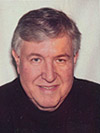| Home | Blog | Ask This | Showcase | Commentary | Comments | About Us | Contributors | Contact Us |

The myth of Deep ThroatCOMMENTARY | June 152, 2005The following is an excerpt from an essay that Barry Sussman wrote in 1997, on the occasion of the 25th anniversary of the Watergate break-in. Sussman was the Washington Post editor in charge of Watergate coverage. He is now editor of the Nieman Watchdog Project. By Barry Sussman The most frequently-asked Watergate question is, "Who is Deep Throat?" I was the Washington Post's editor in charge of the Watergate coverage and I still get asked that a lot, even though it is a quarter-century since the break-in at Democratic headquarters. That's the power of myth: Over the years an anonymous bit player, a minor contributor, has become a giant. For me, half the answer to the Deep Throat question is that I don't know who Deep Throat is. The other half is that it really doesn't matter. Interesting, yes, in that it would solve a mystery. Important to the Post's Watergate reporting, no. Deep Throat barely figured in the Post's Watergate coverage. He was nice to have around, but that's about it. The logic behind the Deep Throat myth is confounding. On the one hand, Post reporters Bob Woodward and Carl Bernstein deserve credit for helping uncover the Watergate scandal. No one disputes that. On the other hand, the basic legend is that one of them, Woodward, did little more than show up with a bread basket that Deep Throat filled with goodies. Anybody see the conflict here? It can't work both ways. The greater the importance of Deep Throat, the less the achievement of the two reporters. I and Post editors above me routinely knew the names of the sources for our Watergate stories. Often people spoke only if promised confidentiality. That meant keeping their names out of the paper, but it didn't mean keeping them from the editors. One day about three months after the break-in -- and after the Post had printed some of its most important articles -- Woodward came to me with a relatively minor story, and with an unusual request. He said he would tell me who the source was if I really wanted to know, but that in this instance he would rather not. I had no problem in acceding. To my recollection, that was the start of the Deep Throat Watergate involvement. In the Post's big stories before and after that moment the link of the burglars to the White House, the flow of money from the Nixon re-election committee to the burglars, the existence of Donald Segretti as a dirty trickster Deep Throat had no role whatsoever. Deep Throat's contributions were infrequent. As I wrote in The Great Coverup, "Woodward could never count on seeing him, and they seldom met at all. Generally, Deep Throat confined his help to telling Woodward whether information we had was correct or explaining what seemed to be the philosophy behind the Watergate spying without getting into the individuals responsible for it." Deep Throat may have known a lot but he didn't give much away. As a mole he was pretty feeble; I can't recall any story we got because of him. True, he offered encouragement that Watergate was important at a time when hardly any other news organizations were going after the story. That was nice, but we knew it on our own. Deep Throat also could be decidedly unhelpful. In December, 1972, he diverted us from a perfectly good story, one saying John Mitchell was ruined politically because of Watergate. Looking back, nothing could have been more obvious. But as we were preparing the article, Deep Throat criticized it, according to Woodward, saying its premise was wrong. It may be that Deep Throat wanted to shield Mitchell. That wouldn't be surprising, as over time a number of people, including a chief prosecutor at Mitchell's Watergate trial, expressed admiration for the former attorney general. John Dean spoke of Mitchell as a father-figure. I have always thought Deep Throat was someone in the Justice Department who may have had warm feelings for Mitchell. Possibly there was a sense of "kinship," a desire to "draw a line" at some point in the Post's coverage. Ben Bradlee has written that Woodward told him who Deep Throat was one spring day sometime after Nixon's resignation, long after the scandal came to a close. That would have been 1975 or later; Bradlee didn't attach a year to the spring he had in mind. The noted editor says he has kept the name secret ever since. This is remarkable for two reasons: First, it would be one of the few secrets Bradlee has ever kept. Second, and more to the point, the fact that Bradlee wasn't concerned enough to ask about Deep Throat's identity for so long argues strongly that the mysterious source had only a minor role in the Post's coverage. Suppose Deep Throat was as important as myth has it: Does anyone believe for a minute that Bradlee, not exactly a shrinking violet, would have been content to sit in the dark while some Nixon hater used the Post to dive-bomb and strafe the White House every few days? This was a period of jeopardy for the Washington Post, for its holdings, and for Bradlee's own reputation. If Deep Throat were important would Bradlee wait until long after the last Watergate headline was written to get his name? That would be stupid, wouldn't it? Bradlee has his share of critics, but I haven't heard anyone say he's stupid. Bradlee says that if he had it to do over again, he'd ask sooner. I doubt it. The Post's managing editor, Howard Simons, the driving force in our Watergate coverage, didn't ask. Neither did a third editor, Harry Rosenfeld. They didn't ask for the same reason I didn't. It's because Deep Throat was basically unimportant to our coverage.
|
|||||||||||



